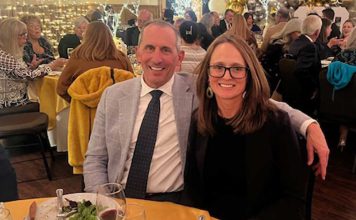Gilroy
– Assistant Police Chief Lanny Brown has spent the better part
of this year bunking with a man from Switzerland and eating meals
in a cafeteria with 243 other law enforcement officers from around
the world.
By Lori Stuenkel
Gilroy – Assistant Police Chief Lanny Brown has spent the better part of this year bunking with a man from Switzerland and eating meals in a cafeteria with 243 other law enforcement officers from around the world.
He said he hopes his experience at the FBI National Academy will prepare him for what could be his future job with the Gilroy Police Department: Chief. He doesn’t expect current Chief Gregg Giusiana to go anywhere just yet, although he became eligible for retirement last August.
“I don’t want to be chief anywhere else. I’m readying myself for the future possibility of being the next chief of Gilroy,” Brown said. “I want to step into the selection process and do well.”
Brown graduated from the 10-week National Academy program, which trains higher-ranking officers in a variety of areas, including leadership and fitness.
He said he was on a waiting list for 18 months – shorter than for some applicants – before enrolling in the program from Jan. 9 to March 18.
“It’s not like a basic academy where you learn a lot of nuts and bolts,” Brown said. “What you’re looking at is the higher-level, more integrated decision-making. It’s so much more than just the place, it’s so much more than just the curriculum. It’s the package deal of the quality of people that are there.”
Brown lived in a dorm – sharing a bathroom with three other men – at the FBI campus in Quantico, Va. and attended class all day, five days a week, sometimes until 8pm. His courses, travel, food and lodging were all provided by the FBI.
He took courses in forensic science, organizational communications, executive leadership, stress management, legal issues for command-level officers, and the required physical training, all taught by supervising FBI special agents.
There was something about Brown’s executive leadership instructor, Tim Turner, that will ensure those lessons stick with him when he returns to Gilroy, Brown said.
“He taught in a way that you felt you could really take and apply. I watched him as a role model – how he modeled being an effective leader,” Brown said.
The stress management class piqued his interest, he said, but it wasn’t all yoga and meditation.
“I actually pictured and was hoping for more of that,” Brown said.
That course was more about being aware of the stress of law enforcement – the cycle of hyper vigilance followed by severe lows.
After classes, Brown completed homework assignments, studied, and wrote essays.
The other command officers enrolled in the academy with Brown offered valuable lessons, as well, he said. There was something about sweating with them in physical training and eating with them in the cafeteria that allowed him to absorb lessons from 49 states and 28 foreign countries.
“It’s learning from each other as we get put in this environment. I learned a whole lot from sitting with my professional peers from all over the world,” Brown said. “It helped my thought process to sit and listen to them talk about the things they’ve faced – even some I never will see.”
For example, one lieutenant from the east coast was dealing with a case of possible bribery and extortion by elected city officials. The case was turned over to the FBI based on the officer’s information, and he was absent from the academy one day as arrests were made, Brown said.
“It’s like going back into history from the old mobster days,” Brown said. “You’d never think in your career you’d have to deal with this stuff.”
Only one other Gilroy Police Department officer in recent history has graduated from the program, Brown said. He said it would be a valuable experience for officers in leadership positions who are looking for some additional knowledge that cannot be found in professional development locally.
According to the FBI program, the officers who participate generally have an average of 19 years of law enforcement experience and return to their agencies to serve in executive-level positions.
“I would recommend it at a strategic point in people’s careers,” Brown said. “It’s ideal for someone with 15 to 25 years of service … who has been in leadership roles. This builds on that and it kind of freshens people up for the home stretch in their career, the second half.”
Brown didn’t make it easy on himself while he was away: He started a master’s program in leadership two weeks in, which sometimes kept him at his desk until 10 or 11 at night.
Brown and his wife Liz – a human resources manager for the county of Monterey – both recently enrolled in the mostly on-line program at St. Mary’s College in Moraga.














